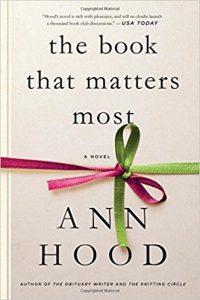AN IDEA THAT MATTERS
The first thing that intrigued me about the novel I’m about to review was the title: The Book That Matters Most. With all the great books in the world, choosing one that matters most seems nearly impossible, so I was curious to see where the author would lead me. The second thing that intrigued me was the main character, Ava, whose husband has recently left her for a woman who attempts to personalize public places by covering objects with colorful yarn.
title: The Book That Matters Most. With all the great books in the world, choosing one that matters most seems nearly impossible, so I was curious to see where the author would lead me. The second thing that intrigued me was the main character, Ava, whose husband has recently left her for a woman who attempts to personalize public places by covering objects with colorful yarn.
But the deeper I got into the novel, I found I was most captivated by the idea that novels have the power to change lives. I’ve written before about the way fiction can decrease readers’ needs to reach quick conclusions in their thinking and to avoid ambiguity and confusion. (“Can Reading Fiction Make You Smarter?”) I’ve also read a great deal about fiction’s ability to inspire readers with empathy for others. But actually change somebody’s life?
Author Ann Hood supports this premise with characters in a book club. Lonely and heartbroken about her husband, Ava begs her best friend to let her know if an opening comes up in the friend’s book club. When a place finally opens, the theme for books to be read that year is “the book that matters most,” and each member must name the book that fills that role for him or her. The list of books selected hooked me totally because it includes the two novels that obsessed me in my youth: To Kill a Mockingbird and A Tree Grows in Brooklyn. I don’t know if I would say these books matter most or that they changed my life, but I’ve read them so many times I can quote passages and give detailed descriptions of scenes, so they mean something to me.
Other books the club chooses include Pride and Prejudice, The Great Gatsby, Anna Karenina, One Hundred Years of Solitude, The Catcher in the Rye, The Unbearable Lightness of Being, and Slaughterhouse-Five.
When Ava’s turn comes to name a book, she’s totally unprepared, and the only book that comes to mind is a novel from her childhood: From Clare to Here. Nobody in the club has heard of it, and nobody can find a copy anywhere. And thus begins Ava’s journey into dark places of her life she thought she’d left behind.
Hood does an excellent job weaving Ava’s history in with her current involvement with the book club and the books they read. Ava remembers she first read From Clare to Here shortly after the first anniversary of her younger sister’s death and a few weeks after her mother jumped off a bridge and was presumed dead. She read it over and over and felt as if it had been written just for her.
In the current story Ava not only mourns the break-up of her marriage but also worries about her adult daughter, Maggie, who has left school in Florence to flee to Paris where she becomes the mistress of an older man. The chapters told from Maggie’s point of view were hard for me to read because they describe the way Maggie’s new lover leads her into heroin addiction and her struggle to escape. But even this difficult experience eventually intertwines with From Clare to Here.
At the book club, Hood uses the novels the members choose to reveal elements of their character and includes appropriate quotes from each book at the beginning of each section. The quote she offers from To Kill a Mockingbird is especially appropriate, not only for its section but for the entire book:
“Until I feared I would lose it, I never loved to read. One does not love breathing.”
Hood has created a celebration of literature, and I recommend it highly. I promise it will make you want to decide which book matters most to you.
Sally Whitney
Sally Whitney is the author of When Enemies Offend Thee and Surface and Shadow, available now from Pen-L Publishing, Amazon.com, and Barnesandnoble.com. When Enemies Offend Thee follows a sexual-assault victim who vows to get even on her own when her lack of evidence prevents police from charging the man who attacked her. Surface and Shadow is the story of a woman who risks her marriage and her husband’s career to find out what really happened in a wealthy man’s suspicious death.
Sally’s short stories have appeared in magazines and anthologies, including Best Short Stories from The Saturday Evening Post Great American Fiction Contest 2017, Main Street Rag, Kansas City Voices, Uncertain Promise, Voices from the Porch, New Lines from the Old Line State: An Anthology of Maryland Writers and Grow Old Along With Me—The Best Is Yet to Be, among others. The audio version of Grow Old Along With Me was a Grammy Award finalist in the Spoken Word or Nonmusical Album category. Sally’s stories have also been recognized as a finalist in The Ledge Fiction Competition and semi-finalists in the Syndicated Fiction Project and the Salem College National Literary Awards competition.
- Web |
- More Posts(67)